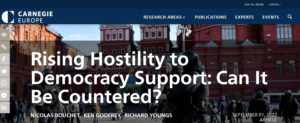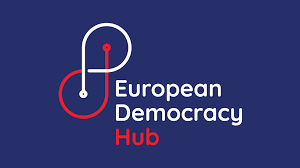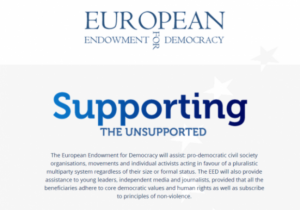 International democracy support organizations (DSOs) are adopting more creative approaches in response to increasingly difficult country environments, including the closing of civic space and restrictions on civil society characteristic of current autocratization trends, says a new report.
International democracy support organizations (DSOs) are adopting more creative approaches in response to increasingly difficult country environments, including the closing of civic space and restrictions on civil society characteristic of current autocratization trends, says a new report.
In some cases, they operate in a fully hostile environment (FHE) – countries such as Azerbaijan, Belarus, Egypt, Myanmar, Russia, and Turkmenistan in which the state is closing the space for domestic democratic actors, is unwilling to engage with external actors in democracy support programs, and tries to cut off domestic actors from both international and domestic support, note analysts Nicolas Bouchet, a visiting fellow at the German Marshall Fund, the European Partnership for Democracy’s Ken Godfrey and Carnegie’s Richard Youngs.
 Some organizations, like the European Endowment for Democracy, the Prague Civil Society Centre, and the National Endowment for Democracy (NED) have engaged in increasingly creative forms of support. Yet an updated, more directly political approach to international democracy support, based on a fuller understanding of what democratic activism entails in hostile environments, should include the following goals, they write in Rising Hostility to Democracy Support: Can It Be Countered?, a report for the European Democracy Hub:
Some organizations, like the European Endowment for Democracy, the Prague Civil Society Centre, and the National Endowment for Democracy (NED) have engaged in increasingly creative forms of support. Yet an updated, more directly political approach to international democracy support, based on a fuller understanding of what democratic activism entails in hostile environments, should include the following goals, they write in Rising Hostility to Democracy Support: Can It Be Countered?, a report for the European Democracy Hub:
- First, DSOs could do more to foster connections between different kinds of democratic actors. New strategies should center on building alliances between cultural and informal groups on the one hand and conventional pro-democracy groups on the other. …… Social protests are becoming a leading edge of resistance to repression, and while there are risks to engaging with such movements, there are ways for DSOs to support them when requested. In particular, external support could help such movements endure over time and channel their dynamism into mainstream political spheres as an effective way of addressing the creeping restrictions of hostile environments.
- Second, discreet forms of funding for democracy actors in FHEs will need to be developed on a much more systematic basis. ….. More detailed guidelines and deeper reflection are needed to ensure that discreet forms of support do not backfire or harm the prospect of democratization. EU states should formulate principles to ensure this approach is rooted in full democratic accountability.
 Third, democracy supporters should do more to bring together democratic actors inside and outside their country of origin…..Localized and delocalized support will need to function as a seamless whole to keep pace with this reality. …..Given the long time frame necessary for delocalized support, democracy support strategies should work to enable publics in FHE countries to become aware of and have access to the products of out-of-country democracy activities, such as media and information projects. It will also be important to support efforts to build bridges between recent political exiles and older, broader diasporas from FHE countries [and] strike a careful balance between support outside and inside the country. …
Third, democracy supporters should do more to bring together democratic actors inside and outside their country of origin…..Localized and delocalized support will need to function as a seamless whole to keep pace with this reality. …..Given the long time frame necessary for delocalized support, democracy support strategies should work to enable publics in FHE countries to become aware of and have access to the products of out-of-country democracy activities, such as media and information projects. It will also be important to support efforts to build bridges between recent political exiles and older, broader diasporas from FHE countries [and] strike a careful balance between support outside and inside the country. …- Fourth and finally, governments and DSOs need to get ahead of the curve. … Funders need to be ready to identify where regimes are becoming more hostile, work on the basis that more countries will become fully hostile, and introduce preemptive changes to their democracy support strategies. A more detailed and systematic audit is required of external democracy policies to analyze the trends toward more hostile environments and to examine whether and how the EU and other actors have made timely tactical shifts in response. RTWT
Signed by @Kasparov63, @FukuyamaFrancis, @fromTGA, and Ministers of Foreign Affairs @JanLipavsky (Czechia) and @UrmasReinsalu (Estonia), the Prague Manifesto for a #FreeUkraine outlines some of the key steps needed to achieve a democratic and prosperous future of the country. https://t.co/TPqpdvesor
— Forum 2000 (@Forum_2000) September 1, 2022







